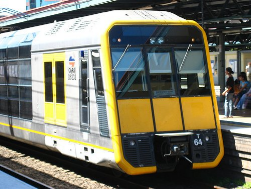
I had boarded the Sydney City Rail train at Central Station bound for Green Square. Morning commuters juggled their cups of coffee, newspapers and PDAs. I contemplated my upcoming meeting. Then I saw something interesting. Two men, one well seasoned and one quite junior, both dressed in traditional Sydney City Rail maintenance crew uniforms and reflective safety vests, were closely pondering some sticky green stuff on the floor. As I am an engineer and, therefore, possess what Australians refer to as a “sticky beak”, I had to ask the obvious question, a question which sounds a bit like the lead-in to a joke: “How many City Rail workers does it take to clean up sticky green stuff?” “One, really”, replied the senior worker, “but this is on-the-job training for junior here.” “You’re lucky”, I said to the younger worker. “A lot of folks aren’t getting training in this economy.” “No training?” thundered the older worker as if I had just insulted his favorite rugby team. “We older guys have to pass on our knowledge and skills to these young bucks. Ya can’t risk something this important, mate.”
Passing on “the Knowledge and Skills”
I arrived at Green Square within a few minutes and went on to my meeting, but what I had seen and heard on the train occupied my thoughts for the rest of the day. On my return trip I paused to observe other rail workers: they were efficient, friendly, proud and confident. The employees were, for the most part good looking and fresh and had consistent, well maintained uniforms. The station was clean and free of litter. Everything from toilets to exits worked well, graffiti was kept on the run, and employees of all ranks gave directions with accuracy, and even walked people part-way to the destination, just as I have seen in some high-end retail establishments. A full restoration of the historical sandstone façade of the Central Station is even just now getting underway, and in this economy, too. Hmmm, it’s all very interesting.
The few rail employees to whom I spoke have been on the job for a long time and though they pointed out the tediousness of the work and some mentioned the “challenges” of dealing with the public, especially foreign visitors (“no offence intended”), they did mention that they were well trained and part of a team that has an important job to do. For a Knowledge Transfer Agent like myself there were some profound nuggets in all of this.
I began my thought process by comparing what I had seen at City Rail with a dinner conversation between some colleagues and me three nights before in Auckland. The conversation started when one of the diners at our table complained about the terrible support he was getting on his new personal organizer cum cell phone: “I don’t speak bloody Turkish and they don’t speak bloody customer!” There were more observations, and examples, when the talk turned to clever ways to avoid first, and even second line tech support and get to “someone who might actually know something”. One gentleman said that his agency’s support contract gives them a “direct line into Tier Three tech support”, and they still aren’t really happy with the support they get, the main issue being the high turnover rate and lack of specific knowledge on the products being supported. Another commented that even though we pay top dollar for technology, and have come to rely on it, the companies from whom we acquire the technology don’t train their personnel at the front lines of support well enough and that we, in turn, suffer – often foregoing a call to the manufacturer or service provider’s tech support.
What I didn’t mention, but I do know firsthand, is that beyond the customer-facing problems in technology and networking companies, there are problems in all of the other areas that we don’t see directly. Design, prototyping, system test, deployment and other areas inside the organization also suffer. Another colleague pointed out that his company cuts training first and has cancelled all training for the next two quarters. “The bottom line, and with it corporate survival, are paramount while employee training, and along with it the confidence, job security, pride and everything else goes out the window”, he added.
So, how is it that Sydney City Rail continues to justify training while global telecom companies – manufacturers, carriers, service providers, and end-users – find training disposable? It is true that one of the first things to be slashed in a down economy is training and, as we are currently in a down economy, I have seen critical training for the people who sell, install, design, engineer, support and manage networks and related communications systems being cut back or completely cancelled. Many of these individuals have not yet gotten caught up on the training that they missed during the last downturn. On the other hand, the very few companies who continue to make the investment in training generally have had less harsh economic problems, have kept valuable proprietary and experiential knowledge within the company, find hiring easier and retention is rarely a problem – all of which contributes positively to the bottom line and cushions the blows delivered by the economy.
Solutions?
Is there a solution? If organizations would stop thinking of training tactically as a mandatory number of hours sitting in a classroom each year and instead focus on knowledge transfer strategically, at all levels and in all jobs within an organization, things would improve without drastically affecting the budget. One Australian police agency beats tedium, improves morale and team work and keeps valuable knowledge in the organization by periodic, planned job swaps: the Inspector responsible for the emergency services call center does duty on the chief’s staff, for instance. One large Chinese telecom firm uses outside trainers and consultants to train their staff on Wu-Li style mentoring and knowledge transfer to enhance the flow of knowledge within the organization, as opposed to the Western approach of outsiders delivering knowledge content. A Russian technical standards agency uses the old apprentice system whereby newly hired university students are matched to a senior individual. In this way the senior individuals have visibility to the state of the art as delivered in the university and the new hires learn agency procedures, history and best practices. What would work for your organization? How can ‘training’ evolve into ‘knowledge transfer’?
Conclusion
In the end business people really are right about “training”. Training should be among the first things to go if training does not show a demonstrable and measurable positive impact on the business. Truth be told, training shouldn’t even have existed in the first place if it could not stand the same scrutiny as other business investments.
So the challenge is how to do away with time consuming “training” and how to replace it with productive “knowledge transfer” in both formal and informal settings. Start by aligning knowledge transfer practices with the objectives of the business, use a mixture of internal and external resources, as needed, and select metrics that gauge the impact of knowledge transfer: greater customer satisfaction, enhanced retention and lower hiring expenses, shorter times to implement plans, fewer on-the-job injuries, and days worked are some metrics that are used in a variety of industries. Pick your metrics, develop a program and get to it. It is said of Wu-Li mentoring that in the meeting of any three people, there are two students and one teacher, and it matters little who plays which role because each has knowledge to offer and to gain. And don’t forget, “Ya can’t risk something this important, mate.”
Editor’s Note: As knowledgeable as he’s witty, Jim teaches many of the courses in the Eogogics IP/Data Networks, Convergence, Optical: SONET/SDH, DWDM, and Security, Public Safety, Law Enforcement curricula. He has been recently spending a fair amount of time down under.

